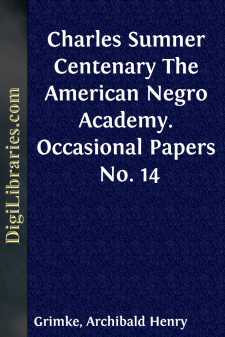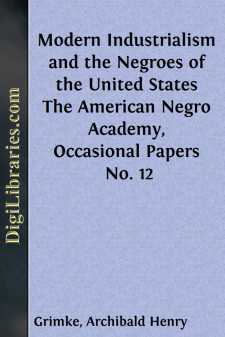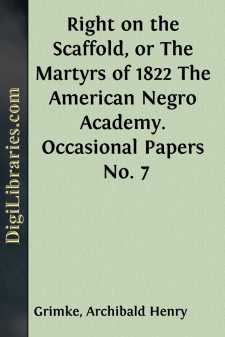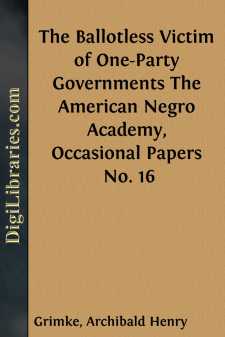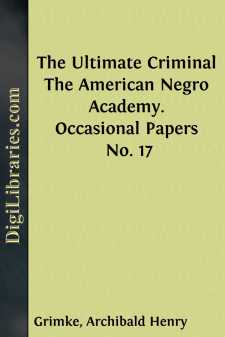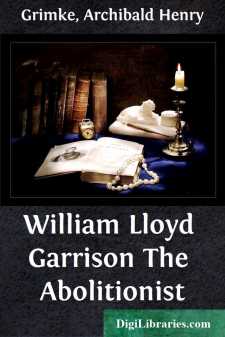Categories
- Antiques & Collectibles 13
- Architecture 36
- Art 48
- Bibles 22
- Biography & Autobiography 813
- Body, Mind & Spirit 142
- Business & Economics 28
- Children's Books 17
- Children's Fiction 14
- Computers 4
- Cooking 94
- Crafts & Hobbies 4
- Drama 346
- Education 46
- Family & Relationships 57
- Fiction 11829
- Games 19
- Gardening 17
- Health & Fitness 34
- History 1377
- House & Home 1
- Humor 147
- Juvenile Fiction 1873
- Juvenile Nonfiction 202
- Language Arts & Disciplines 88
- Law 16
- Literary Collections 686
- Literary Criticism 179
- Mathematics 13
- Medical 41
- Music 40
- Nature 179
- Non-Classifiable 1768
- Performing Arts 7
- Periodicals 1453
- Philosophy 64
- Photography 2
- Poetry 896
- Political Science 203
- Psychology 42
- Reference 154
- Religion 513
- Science 126
- Self-Help 84
- Social Science 81
- Sports & Recreation 34
- Study Aids 3
- Technology & Engineering 59
- Transportation 23
- Travel 463
- True Crime 29
Archibald Henry Grimke
Archibald Henry Grimké was a prominent African-American lawyer, intellectual, journalist, diplomat, and civil rights activist during the late 19th and early 20th centuries. He was a key figure in the fight against racial discrimination and served as the president of the American Negro Academy. Grimké also wrote extensively, including a biography of his famous half-sister, Angelina Grimké, and other works advocating for the rights and advancement of African Americans.
Author's Books:
Sort by:
CHARLES SUMNER. Every time a great man comes on the stage of human affairs, the fable of the Hercules repeats itself. He gets a sword from Mercury, a bow from Apollo, a breastplate from Vulcan, a robe from Minerva. Many streams from many sources bring to him their united strength. How else could the great man be equal to his time and task? What was true of the Greek Demigod was likewise true of Charles...
more...
What is that tremendous system of production, organization and struggle known as modern industrialism going to do with the Negroes of the United States? Passing into its huge hopper and between its upper and nether millstones, are they to come out grist for the nation, or mere chaff, doomed like the Indian to ultimate extinction in the raging fires of racial and industrial rivalry and progress?...
more...
The Martyrs of 1822. He was black but comely. Nature gave him a royal body, nobly planned and proportioned, and noted for its great strength. There was that in his countenance, which bespoke a mind within to match that body, a mind of uncommon native intelligence, force of will, and capacity to dominate others. His manners were at once abrupt and crafty, his temper was imperious, his passions and...
more...
he legal status of the Negro in the United States is difficult to define or describe, because on paper he is an American citizen, entitled to the rights of an American citizen, but in practice he does not get what he is entitled to or anything like it in certain parts of the Republic. His life is safe-guarded by written law, and so is his liberty and his activities in pursuit of happiness and to better...
more...
THE ULTIMATE CRIMINAL. It is the fashion nowadays for every one with a stone in his hand to take a shy at the poor Negro on account of his sins of commission and omission. It is enough that some member of the race is caught flagrante delicto or merely on suspicion of evil doing to get himself into the public pillory and the rest of the colored people into our national rogues’ gallery, where they...
more...
"Help came but slowly" to the reformer. With a single instrument he had stirred the nation, as no other man had done, on the slavery question. He had thrown the South into widespread excitement, and thawed the apathy of the North into widespread attention. He had won an almost instant hearing for his cause. But he knew that this was not enough. Effective as he had shown the weapon of the press...
more...


